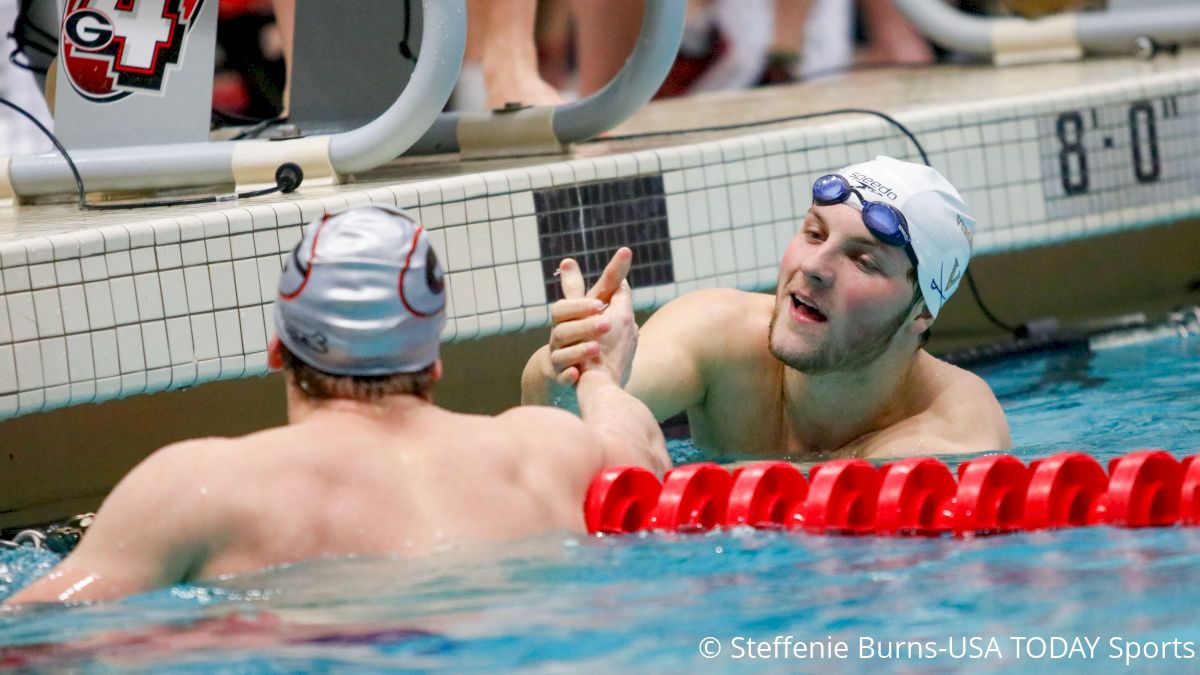Why The College Dual Meet Exhibition Mercy Rule Is Dumb
Why The College Dual Meet Exhibition Mercy Rule Is Dumb
A discussion of why the exhibition mercy rule in college swimming and diving dual meets is dumb and delegitimizes competition.

Imagine this... It's an October Saturday afternoon in Tuscaloosa, AL, and the top-ranked Crimson Tide football team is obliterating Vanderbilt 35-10 at the end of the third quarter. Alabama puts up another two touchdowns in the fourth quarter, making the final score 49-10.
But, wait! There's a twist.
Instead of allowing the game to finish as is, the powers that be actually decide to handicap Alabama. Those last 14 points the Crimson Tide scored in the fourth quarter? Yeah, those don't count. As a matter of fact, they are just given to Vanderbilt. Because why not? It needs to be fair, right? We wouldn't want to make anyone look bad.
Thus, the final score on paper is 35-24 — an entirely different picture than the real story tells.
Spare me.
Does this sound familiar? It should, because this has been happening at college dual meets for as long as I can remember.
At the very end of a meet — the last two to three events — when Team A is putting a beating on Team B, Team A can choose to exhibition their swims — aka non-scoring swims. This allows Team B to rack up a bunch of points to inflate their score and make the loss look a lot more bearable than it really should be.
Swimming is a country club sport. We're too soft.
But, why? What is the point?
According to an unnamed Division I associate head coach, "I honestly think it's stupid... I don't think it should be any different (compared to other sports) with swimming."
As a former swimmer for a Division I Power Five school, the rationale behind this always alluded me. Not only is it embarrassing — especially being on the losing end — but it is also, or should be, deeply frustrating as a competitor to receive pity points.
What kind of lesson does that teach? Well, for one, it shows that the swimming community doesn't value regular-season meets — devaluing the sport throughout most of the year. But that's another topic for another day.
Staying on tune, it teaches that failure doesn't have to be a reality. News flash: failure is, should, and always will be a reality.
The best way to learn in life is through loss and failure because that is where you find out what you're really made of. That is where you learn how to overcome adversity. Swimming, and sports in general, is simply another medium for teaching life lessons.
Unless I'm missing something completely, there really isn't a strong argument behind inflating the score with exhibition swims. The winning team still knows they won and the losing team still knows they lost. The athletics department administration and the fans still know who won and lost.
Does the losing team — coaches and swimmers — really feel better about themselves when they lose 170-130 instead of 211-89?
Short answer: probably not.
According to University of Kentucky assistant coach Mason Norman, "Swimming is a country club sport. We're too soft."
Stern, but fair. The reality is that this type of mentality is deeply embedded into the fabric of swimming culture.
Name another sport in which people care more about "just making it" (qualifying for a meet, meeting a time standard) than winning. Name another sport in which someone can walk away pleased with 17th place so long as he or she went a season-best time.
That's just like Georgia quarterback Jake Fromm walking away from Monday night's College Football Playoff national championship game saying, "Yeah we lost, but I had my season-best completion percentage so it was a good night." Neither of those things happened, but you get the point.
Listen, if you've read this far you probably think I'm sort of curmudgeon who only values winning. That couldn't be farther from the truth. There is certainly value in celebrating small victories even in the midst of loss and failure. The point is, there isn't value in distorting reality to make ourselves feel better.
There are no participation trophies in life and there shouldn't be any in swimming, either.